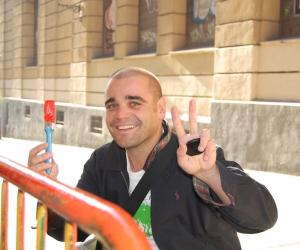Maverick Spanish architect Santiago Cirugeda has earned a reputation for ignoring urban laws. His projects focus on under-used parts of Seville and other Spanish cities, with the aim of making them more liveable for the residents. Cirugeda argues that all architecture makes certain political statements and that architects should be aware of the context in which they build and how they impact neighbouring buildings and areas.
“I try to show the people their rights,” says Cirugeda. “To make architecture is to make a political question. You must have responsibility to think about your projects, and the social projects.”
One of Cirugeda’s first projects involved creating a playground in Seville:
“I did my first project 21 years ago. The people were demanding a playground. Then I wasn’t an architect; I was only a citizen who listened to the people.”
Cirugeda recalls thinking that if the city stopped them from creating the playground then he would find a way around the law. He applied for a skip licences, and when it was granted he put a seesaw on top of the skip. The police called him in for questioning but could find no legal ground on which to ban the installation.
Cirugeda believes that architects today have become too involved with the aesthetic of what they do. In his Design Indaba Conference talk, Cirugeda laughed at the idea that people call his work ugly – arguing that it is more important for architecture to serve a social purpose, to be useful and to unite people, than it is for it to be beautiful. His projects often involve big community or student teams, and he has recently been involved with the construction of schools, art centres and community centres.
“I prefer the process [of building] with the people. I prefer to make 10 small projects than one bigger.”
Cirugeda is currently trying to create new laws in Europe concerning self-built projects.
“We spent the last year working with the people, making new laws and new protocols.”








